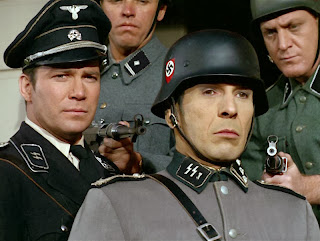The original title for the
sequel to Afrika Reich was THE VANILLA JEWS. However, my editor
didn’t think it sounded commercial enough, so I changed it. For the past couple
of years this blog has been about the original book, now it’s time to start
looking forward (spoiler free... ish) to the next one.
So what to tell you? When I
first started on Book 2, I meant it as a direct follow-up; as the years have
passed, however, it has subtly shifted. I now see it as a ‘parallel sequel’ –
although it continues events of the first book, and develops the existing story
and characters, certain aspects of the original have been dropped. It is
significantly more ambitious with an interweaving, multi-stranded narrative and
more emphasis on the characters than action (though there’s still a healthy
dose of the latter).
The one thing it is not is a rehash of the first book.
There’s a lot of pressure in publishing to create a series and/or repeat an
initial success – but I have scant interest in this. What engages me is the
possibility of doing something different, something unexpected. As I was
recently advised by a wily American film producer: ‘never go for the sure
thing’. It could be a maxim for Book 2.
 |
| A propaganda poster from the 1930s |
At the centre of the story
is the Nazis’ plan to deport the Jews of Europe to Madagascar, an island off
the east coast of Africa. Prior to the Holocaust this was to be their fate.
Some historians argue that Madagascar was nothing more than a fantasy or
smokescreen to cover up the real killing. However, my research shows detailed
preparations were made by the Nazis and that the subject was discussed and
approved at the highest level. When Hitler was shown the plan in the summer of
1940 he responded that it was ‘very good’.
Perhaps more disturbingly, as early
as 1938 the British were also in discussions to exile the Jews to Africa. We
can never know the truth path of a speculative history but the thought of a
Jewish Madagascar is not improbable. As an aside, Madagascar is the world’s
largest producer of vanilla – hence the original title; vanilla remains of
leitmotif throughout the text.
 |
| The odious Globus |
Without wanting to be a
hostage to the future the new book will be published in time for Christmas 2014.
And the title? When my editor said The
Vanilla Jews didn’t work I had an instant alternative (no pun intended). It
has already been registered and ISBNed. You heard it here first:
THE
MADAGASKAR PLAN












